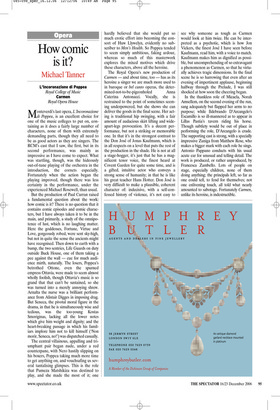How comic is it?
Michael Tanner
L’Incoronazione di Poppea Royal College of Music Carmen Royal Opera House Monteverdi’s last opera, L’Incoronazione di Poppea, is an excellent choice for one of the music colleges to put on, containing as it does a fairly large number of characters, none of them with extremely demanding parts, though they all need to be as good actors as they are singers. The RCM’s cast that I saw, the first, but in its second performance, was mainly as impressive as I have come to expect. What was startling, though, was the hideously out-of-tune playing of the orchestra in the introduction, the cornets especially. Fortunately when the action began the playing improved, though there was less certainty in the performance, under the experienced Michael Rosewell, than usual.
But the production of Paul Curran raised a fundamental question about the work: how comic is it? There is no question that it contains comic episodes and comic characters, but I have always taken it to be in the main, and primarily, a study of the omnipotence of lust, which is no laughing matter. Here the goddesses, Fortune, Virtue and Love, gorgeously robed, were sent sky-high, but not in quite the sense the ancients might have recognised. Then down to earth with a bump, the two sentries, Life Guards on duty outside Buck House, one of them taking a pee against the wall — cue for much audience mirth, naturally. The losers, Poppea’s betrothed Ottone, even the spurned empress Ottavia, were made to seem almost wholly foolish, though Ottavia’s music is so grand that that can’t be sustained, so she was turned into a merely annoying shrew. Arnalta the nurse was a brilliant performance from Alistair Digges in imposing drag. But Seneca, the pivotal moral figure in the drama, in that he is simultaneously wise and tedious, was the too-young Kostas Smoriginas, lacking all the lower notes which give him weight and dignity; and the heart-breaking passage in which his familiars implore him not to kill himself (‘Non morir, Seneca, no!’) was dispatched casually.
The central villainous, appalling and triumphant pair began nude, under a red counterpane, with Nero hastily slipping on his boxers, Poppea taking much more time to get anything on, and vouchsafing us several tantalising glimpses. This is the role that Pumeza Matshikiza was destined to play, and she made the most of it; one hardly believed that she would put so much erotic effort into becoming the consort of Huw Llywelyn, evidently no subscriber to Men’s Health. So Poppea tended to seem simply ambitious, faking ardour, whereas so much of this masterwork explores the mixed motives which drive these characters, above all the heroine.
The Royal Opera’s new production of Carmen — and about time, too — has as its heroine a singer we are much more used to in baroque or bel canto operas, the deter mined-not-to-be-pigeonholed Anna Caterina Antonacci. Vocally, she is restrained to the point of sometimes seeming underpowered, but she shows she can deliver the goods in the final scene. Her acting is traditional hip swinging, with a fair amount of audacious skirt lifting and wideapart-legs provocation. It’s a decent performance, but not a striking or memorable one. In that it’s in the strongest contrast to the Don José of Jonas Kaufmann, which is in all respects on a level that puts the rest of the production in the shade. He is not at all a stage-hogger, it’s just that he has a magnificent tenor voice, the finest heard at Covent Garden for quite some time, and is a gifted, intuitive actor who conveys a strong sense of humanity; in that he is like his great teacher Hans Hotter. Don José is very difficult to make a plausible, coherent character of: indecisive, with a self-confessed history of violence, it’s not easy to see why someone as tough as Carmen would look at him twice. He can be interpreted as a psychotic, which is how Jon Vickers, the finest José I have seen before Kaufmann, read him, with a voice to match. Kaufmann makes him as dignified as possible, but uncomprehending of so extravagant a phenomenon as Carmen, so that he virtually achieves tragic dimensions. In the final scene he is so harrowing that even after an evening of impertinent applause, beginning halfway through the Prelude, I was still shocked at how soon the cheering began.
In the thankless role of Micaela, Norah Amsellem, on the second evening of the run, sang adequately but flapped her arms to no purpose; while Ildebrando D’Arcangelo’s Escamillo is so ill-mannered as to appear in Lillas Pastia’s tavern riding his horse. Though subtlety would be out of place in performing the role, D’Arcangelo is crude. The supporting cast is strong, with a specially impressive Zuniga from Matthew Rose, who makes a bigger mark with each role he sings. Antonio Pappano conducts with his usual acute ear for unusual and telling detail. The work is produced, or rather unproduced, by Francesca Zambello. Lots of people on stage, especially children, none of them doing anything; the principals left, so far as one could tell, to fend for themselves; not one enlivening touch, all told what nearly amounted to sabotage. Fortunately Carmen, unlike its heroine, is indestructible.






































































































































 Previous page
Previous page